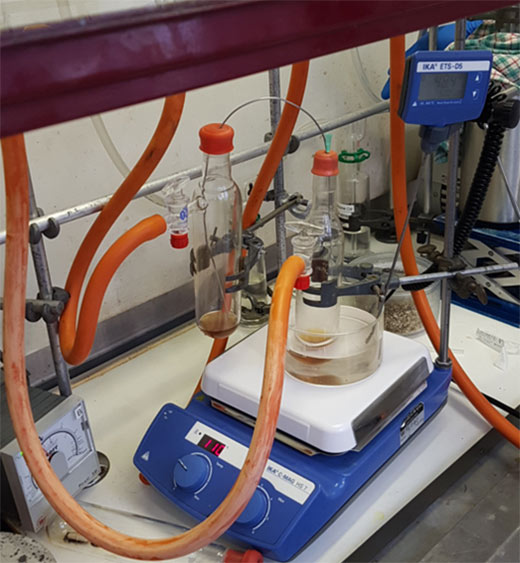Innovative graduate training to handle air-sensitive reagents
Researchers in the Department of Chemistry have pioneered a new experimental method for training graduate students in the safe handling of air-sensitive compounds.
The synthesis of organic molecules, with applications ranging from pharmaceuticals and agrochemicals to next generation molecular materials, often relies on the use of air-sensitive reagents. Teaching the next generation of researchers how to safely handle these high-risk, flammable, and potentially lethal reagents in an appropriate way is a key priority.
Although some entry-level experiments using air-sensitive reagents are incorporated into advanced undergraduate laboratories, there remains a need to train researchers embarking on graduate-level study in a more operationally-challenging way.

Cannula transfer of air sensitive materials
With this goal in mind, researchers at the University of York, led by Professor Ian Fairlamb developed an innovative training experiment for new graduate students. This three-step reaction process (see Scheme) was designed to teach students the safe use of Schlenk lines, high vacuum pumps, liquid nitrogen traps, cannula transfers, and syringe techniques. In particular, the experiment provides important illustrations of the many things that can go wrong with a sensitive reaction when improper technique is employed.

Synthetic procedure used for training graduate students
This experiment has now been used to train over 150 MSc and PhD students embarking on synthetic chemistry research degrees here at the University of York. By publishing the methodology in Journal of Chemical Education, the team hope that those responsible for training graduate students at other universities will also consider incorporating this exercise into their programmes.
Professor Fairlamb says: “Laboratory safety is of paramount importance when training graduate students to become independent researchers – we clearly see many of our graduates developing their confidence as a result of this hands-on training. This experiment provides an excellent opportunity to develop skills in handling high-risk reagents, while also discussing many facets of organic chemistry, such as catalysis, drug discovery, medicinal chemistry, and most importantly, laboratory safety.”
Full details can be found in the paper written by Dr Michael James, Dr George Clarke, Charlotte Lee and Professor Ian Fairlamb in the Journal of Chemical Education.